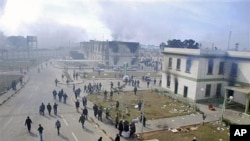Witnesses in Tripoli say the Libyan military is firing upon anti-government protesters, as the unrest that began in the east has spread to the capital. Dozens of people were reported killed Monday, even before the latest crackdown on demonstrators.
The violence is the most serious in Tripoli since the unrest began and appears to mark a rapid escalation. Amateur video and witness accounts tell of gunfire, looting - allegedly by security forces - and general fear in the city.
Some government buildings are reported to have been set on fire, and anti-government demonstrators said to be rallying across the city.
Information is severely restricted by the Libyan government. The Internet is largely shut down and phone service is curtailed, making reports difficult to verify independently.
In Benghazi, the eastern Libyan city where the protests started, witnesses say anti-government forces have taken control. Some in the security services are believed to have switched sides.
Amateur video show people described as demonstrators in control of what appears to be military-style weaponry, indicating that they either have been given, or seized, part of the government's arsenal.
|
VOA Correspondent Elizabeth Arrott speaks with Middle East Monitor Host Susan Yackee:
|
The protest movement is also said to have spread to several other cities.
One of the sons of Libyan leader Moammar Gadhafi addressed the nation early Monday. Saif al-Islam Gadhafi warned of civil war and a fight to the last man if the unrest continues. The younger Gadhafi blamed Islamic extremists, foreign elements, and criminals of being behind the unrest. He also warned that continued protests jeopardize revenue from the nation's oil reserves - the largest in Africa.
But Saif al-Islam Gadhafi also spoke about the possibility of reforms, including dialogue and changes to the constitution.
Libya raw protest video:
This has become a familiar step as uprisings against long-serving rulers have spread across North Africa and the Middle East, with timing of such concessions appearing critical to the ability of leaders to withstand popular protests.
In Tunisia and Egypt, anti-government forces rejected offers of reform as too little too late, and their presidents stepped down. In Bahrain, Yemen and Jordan, rulers have tried to meet some of the protesters' demands but it remains unclear what effect they will have.
Moammar Gadhafi has ruled Libya since 1969 and his alleged links to terror groups made Libya for decades a pariah state. In the past eight years, he has sought to repair his international reputation, but the heavy internal hand of the security apparatus has remained intact.
In the past day, new voices have been added to the uprising. The influential Warfallah tribe is said to have joined the anti-government movement. And the nation's representative to the Arab League, Abdel Moneim el Houni, has thrown in his lot with the protesters.



















